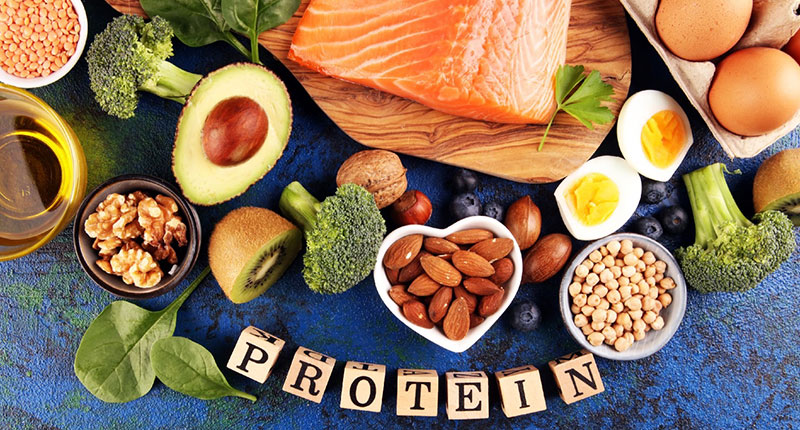Protein is an essential macronutrient that plays a crucial role in maintaining overall health and well-being. From muscle building to immune support, protein offers an array of benefits that make it an indispensable part of our diet. In this article, we will delve into the incredible advantages of protein consumption and explore how it positively impacts various aspects of our health.
What is Protein?
Proteins are complex molecules made up of amino acids, which are the building blocks of the human body. There are 20 different amino acids, and they are vital for numerous physiological functions, such as cell repair, hormone production, and enzyme synthesis.
Protein and Muscle Building
Importance of Protein for Muscle Growth
When it comes to building muscle, protein takes center stage. During exercise, muscle tissues undergo small tears that need repair and recovery. Protein provides the necessary amino acids to help repair and rebuild these tissues, leading to muscle growth and increased strength.
Protein Sources for Muscle Building
Some excellent sources of protein for muscle building include lean meats like chicken, turkey, and beef, as well as fish, eggs, and dairy products like Greek yogurt and cottage cheese.
Protein for Weight Management
How Protein Affects Metabolism
Protein has a higher thermic effect compared to fats and carbohydrates, meaning the body burns more calories to digest and process protein. This can boost metabolism and aid in weight management.
High-Protein Diets for Weight Loss
Studies have shown that high-protein diets can help suppress appetite, reduce calorie intake, and promote feelings of fullness, making it easier to stick to a calorie deficit and achieve weight loss goals.
Protein and Energy Levels
Protein's Role in Energy Production
Protein plays a significant role in energy production by providing a steady supply of amino acids that the body can convert into glucose through a process called gluconeogenesis.
Benefits of Protein for Sustained Energy
Unlike quick energy sources like carbohydrates, protein provides sustained energy, keeping us feeling fuller for longer and maintaining a stable blood sugar level throughout the day.
Protein and Immune System
How Protein Supports Immune Function
Antibodies, which are essential components of the immune system, are made up of proteins. These antibodies help the body defend against infections and illnesses.
Essential Amino Acids for Immunity
Certain amino acids, such as glutamine and arginine, are particularly crucial for supporting immune function and promoting a robust defense against pathogens.
Protein and Hair, Skin, and Nails
The Impact of Protein on Physical Appearance
Protein is essential for the growth and repair of tissues, including those that make up our hair, skin, and nails. A protein-rich diet can contribute to healthier and more vibrant-looking hair and skin.
Protein-Rich Foods for Healthy Hair, Skin, and Nails
Some protein-rich foods that are beneficial for hair, skin, and nails include almonds, walnuts, eggs, and fatty fish like salmon.
Protein for Bone Health
Protein's Contribution to Bone Density
Protein plays a role in maintaining bone health and density, especially when combined with other bone-supporting nutrients like calcium and vitamin D.
Combining Protein with Calcium for Strong Bones
Ensuring an adequate intake of protein along with calcium-rich foods can contribute to strong and healthy bones.
Protein and Cardiovascular Health
Protein and Heart Health
Research suggests that protein, especially from plant-based sources like legumes and nuts, can have a positive impact on heart health by reducing the risk of heart disease.
Protein Sources for a Healthy Heart
Fish, nuts, seeds, and soy-based products are excellent sources of protein that are also beneficial for cardiovascular health.
Protein for Brain Function
How Protein Affects Cognitive Health
Proteins are involved in neurotransmitter production, which are chemicals that enable communication between brain cells. This, in turn, affects cognitive function.
Protein-Rich Foods for Brain Function
Foods rich in omega-3 fatty acids, such as fish, chia seeds, and flaxseeds, can complement protein intake and support brain health.
Protein and Recovery
Protein's Role in Post-Exercise Recovery
After intense physical activity, the body needs protein to repair and rebuild muscle tissues, helping athletes and fitness enthusiasts recover faster.
Best Protein Sources for Recovery
Whey protein, found in dairy products and protein supplements, is considered one of the best protein sources for post-exercise recovery.
How Much Protein Do You Need?
Recommended Daily Protein Intake
The recommended protein intake varies based on factors like age, gender, and activity level. However, a general guideline is to consume about 0.8 to 1 gram of protein per kilogram of body weight.
Factors Influencing Protein Requirements
Factors such as exercise intensity, overall health goals, and muscle mass can influence an individual's specific protein needs.
Protein Supplements
Types of Protein Supplements
Protein supplements come in various forms, including whey protein, casein protein, soy protein, and plant-based protein powders.
Pros and Cons of Protein Supplements
While protein supplements can be convenient and help meet daily protein requirements, they should not replace whole-food sources in a balanced diet.
Combining Protein with Other Nutrients
Protein and Carbohydrates
Pairing protein with carbohydrates can provide a well-rounded meal that sustains energy levels and promotes muscle recovery.
Protein and Fats
Incorporating healthy fats with protein can enhance the absorption of fat-soluble vitamins and support overall health.
Conclusion
Protein is undeniably one of the most crucial nutrients for our body's proper functioning. From its role in muscle building and weight management to its impact on the immune system and overall well-being, the benefits of protein are truly incredible. Ensuring an adequate intake of protein from a variety of sources can help us achieve optimal health and vitality.
FAQs
- Is a high-protein diet safe for everyone? While a high-protein diet can be beneficial for many people, it may not be suitable for those with certain kidney or liver conditions. It's essential to consult with a healthcare professional before making significant changes to your diet.
- Can I get enough protein on a vegetarian or vegan diet? Absolutely! There are plenty of plant-based protein sources, such as legumes, tofu, tempeh, quinoa, and nuts, that can provide all the essential amino acids needed for a well-rounded diet.
- Are protein supplements necessary for building muscle? While protein supplements can be convenient, they are not essential for building muscle. A well-balanced diet that includes adequate protein from whole foods can be sufficient for most individuals.
- Can protein help with hair growth? Yes, protein is essential for hair growth and health. It provides the necessary building blocks for keratin, the protein that makes up our hair strands.
- Can too much protein be harmful? Excessive protein intake can strain the kidneys in individuals with pre-existing kidney conditions. However, for the average person, moderate to high protein intake is generally safe and beneficial.













